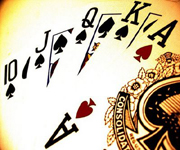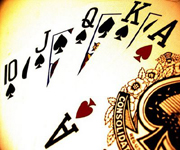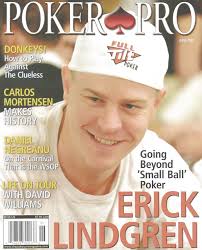Free Registration for Poker PRO Magazine: www.pokerpromagazine.com

Description of Poker Hands
Five of a Kind
A five of a kind (which is only possible when using wild cards) is the highest possible hand. If more than one hand has five of a kind, the higher card wins (Five Aces beats five kings, which beat five queens, and so on).
Straight Flush
A straight flush is the best natural hand. A straight flush is a straight (5 cards in order, such as 5-6-7-8-9) that are all of the same suit. As in a regular straight, you can have an ace either high (A-K-Q-J-T) or low (5-4-3-2-1). However, a straight may not ‘wraparound’. (Such as K-A-2-3-4, which is not a straight). An Ace high straight-flush is called a Royal Flush and is the highest natural hand.
Four of a Kind
Four of a kind is simply four cards of the same rank. If there are two or more hands that qualify, the hand with the higher-rank four of a kind wins. If, in some bizarre game with many wild cards, there are two four of a kinds with the same rank, then the one with the high card outside the four of the kind wins. General Rule: When hands tie on the rank of a pair, three of a kind, etc, the cards outside break ties following the High Card rules.
Full House
A full house is a three of a kind and a pair, such as K-K-K-5-5. Ties are broken first by the three of a kind, then pair. So K-K-K-2-2 beats Q-Q-Q-A-A, which beats Q-Q-Q-J-J. (Obviously, the three of a kind can only be similiar if wild cards are used.)
Flush
A flush is a hand where all of the cards are the same suit, such as J-8-5-3-2, all of spades. When flushes ties, follow the rules for High Card.
Straight
A straight is 5 cards in order, such as 4-5-6-7-8. An ace may either be high (A-K-Q-J-T) or low (5-4-3-2-1). However, a straight may not ‘wraparound’. (Such as Q-K-A-2-3, which is not a straight). When straights tie, the highest straight wins. (AKQJT beats KQJT9 down to 5432A). If two straights have the same value (AKQJT vs AKQJT) they split the pot.
Three of a Kind
Three cards of any rank, matched with two cards that are not a pair (otherwise it would be a Full House . Again, highest three of a kind wins. If both are the same rank, then the compare High Cards.
Two Pair
This is two distinct pairs of card and a 5th card. The highest pair wins ties. If both hands have the same high pair, the second pair wins. If both hands have the same pairs, the high card wins.
Pair
One pair with three distinct cards. High card breaks ties.
High Card
This is any hand which doesn’t qualify as any one of the above hands. If nobody has a pair or better, then the highest card wins. If multiple people tie for the highest card, they look at the second highest, then the third highest etc. High card is also used to break ties when the high hands both have the same type of hand (pair, flush, straight, etc).
Betting
So, how do you bet? Poker is, after all, a gambling game. In most games, you must ‘ante’ something (amount varies by game, our games are typically a nickel), just to get dealt cards. After that players bet into the pot in the middle. At the end of the hand, the highest hand (that hasn’t folded) wins the pot. Basically, when betting gets around to you (betting is typically done in clockwise order), you have one of three choices:
Call
When you call, you bet enough to match what has been bet since the last time you bet (for instance, if you bet a dime last time, and someone else bet a quarter, you would owe fifteen cents).
Raise
When you raise, you first bet enough to match what has been bet since the last time you bet (as in calling), then you ‘raise’ the bet another amount (up to you, but there is typically a limit.) Continuing the above example, if you had bet a dime, the other person raised you fifteen cents (up to a quarter), you might raise a quarter (up to fifty cents). Since you owed the pot 15 cents for calling and 25 for your raise, you would put 40 cents into the pot.
Fold
When you fold, you drop out of the current hand (losing any possibility of winning the pot), but you don’t have to put any money into the pot.
Betting continues until everyone calls or folds after a raise or initial bet.





